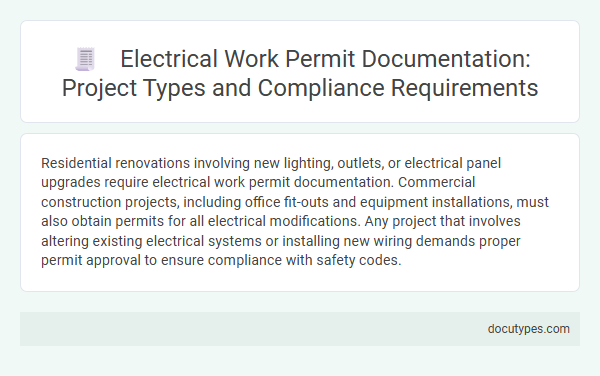Residential renovations involving new lighting, outlets, or electrical panel upgrades require electrical work permit documentation. Commercial construction projects, including office fit-outs and equipment installations, must also obtain permits for all electrical modifications. Any project that involves altering existing electrical systems or installing new wiring demands proper permit approval to ensure compliance with safety codes.
Introduction to Electrical Work Permit Documentation
Electrical work permit documentation is essential for ensuring safety and compliance in electrical projects. It serves as an official approval process required before commencing electrical installations or modifications.
- Residential Electrical Projects - Electrical work in homes, such as wiring or panel upgrades, requires permit documentation to meet safety codes.
- Commercial Electrical Installations - Businesses must obtain permits for electrical systems installations or significant alterations to ensure regulatory compliance.
- Industrial Electrical Work - Complex electrical projects in industrial settings mandate permit documentation to address safety risks and technical standards.
Importance of Permits in Electrical Projects
| Project Type | Permit Requirement | Importance of Permits |
|---|---|---|
| New Residential Construction | Electrical work permits are mandatory before installation. | Ensures compliance with national electrical codes, promoting safety and reducing fire risks. |
| Electrical Panel Upgrades | Permit required for any modification or replacement of electrical panels. | Verifies that upgrades meet current standards, preventing overloads and potential hazards. |
| Commercial Building Renovations | Permits needed for wiring changes or new electrical systems. | Confirms adherence to local regulations, ensuring operational safety and reliability. |
| Installation of Permanent Electrical Systems | Permits must be obtained prior to installation. | Guarantees inspections and approvals that safeguard property and occupants. |
| Major Electrical Repairs | Permits required if repairs involve system alterations. | Ensures repairs are done correctly, maintaining system integrity and safety. |
| Solar Panel Installations | Electrical permits are compulsory for integration with existing systems. | Validates proper connection to the grid, enhancing energy efficiency and safety. |
Common Project Types Requiring Electrical Work Permits
Electrical work permits are essential for various projects to ensure safety and compliance with local codes. Common project types requiring these permits include installing new electrical systems, upgrading existing wiring, and adding outlets or lighting fixtures. You should always check with your local authorities before starting any electrical project to determine if a permit is necessary.
Residential Electrical Work Permit Documentation
Residential electrical work projects often require an electrical work permit to ensure safety and compliance with local building codes. This includes installations, repairs, or upgrades to wiring, lighting, and electrical panels within your home.
Projects such as adding new circuits, replacing or installing electrical panels, and major rewiring typically need proper permit documentation. Small tasks like changing light fixtures or outlets may not require permits but always verify local regulations. Obtaining the correct permit helps prevent hazards and ensures inspections are conducted for quality assurance.
Commercial and Industrial Project Permit Requirements
Commercial and industrial projects involving new electrical installations, upgrades, or modifications typically require an electrical work permit. This includes projects such as installing lighting systems, power distribution panels, and heavy machinery connections. Your documentation must comply with local safety codes and regulations to ensure approval and safe operation.
Essential Compliance Standards for Electrical Permits
Projects involving electrical installations must adhere to strict permitting requirements to ensure safety and compliance with local regulations. Electrical work permit documentation is critical for validating that the project meets essential codes and standards.
- New Electrical Installations - Any new wiring or electrical system installation requires a permit to confirm compliance with the National Electrical Code (NEC).
- Major Renovations - Significant modifications or upgrades to existing electrical systems must be documented to ensure all changes meet safety and code standards.
- Service Upgrades and Repairs - Upgrading electrical panels or performing major repairs necessitates permits to maintain regulatory compliance and prevent hazards.
Key Documentation for Electrical Permit Applications
Electrical work permit documentation is essential for projects involving new electrical installations, significant modifications, or major repairs. Common projects include residential rewiring, commercial electrical upgrades, and installation of electrical systems in new constructions.
Key documentation for electrical permit applications typically includes detailed project plans, load calculations, and compliance certificates. Additional required documents are contractor licenses, inspection reports, and safety compliance forms to ensure adherence to local electrical codes.
Inspection and Approval Processes
Electrical work permits are mandatory for projects involving wiring installation, upgrades, or significant modifications to electrical systems. These permits ensure that all electrical work complies with local safety codes and regulations.
Inspection and approval processes verify that the electrical installations meet technical standards and pose no safety hazards. Certified inspectors conduct site evaluations before granting final approval for the project to proceed or be operational.
Common Compliance Pitfalls and How to Avoid Them
Electrical work permits are essential for various construction and renovation projects to ensure safety and regulatory compliance. Understanding which projects require documentation helps prevent legal issues and safety hazards.
- New Residential and Commercial Installations - Permits are mandatory for wiring new buildings to ensure adherence to electrical codes.
- Major Renovations or Upgrades - Projects involving significant changes to existing electrical systems require proper permit documentation to avoid compliance violations.
- Installation of High-Power Appliances - Adding equipment like HVAC systems or industrial machinery often triggers permit requirements to guarantee safe operation.
Common compliance pitfalls include incomplete permit applications, failure to schedule inspections, and using unlicensed electricians, all of which can be avoided with thorough preparation and adherence to local regulations.
What Types of Projects Require Electrical Work Permit Documentation? Infographic

